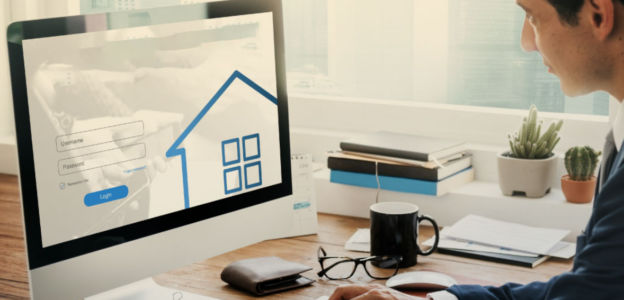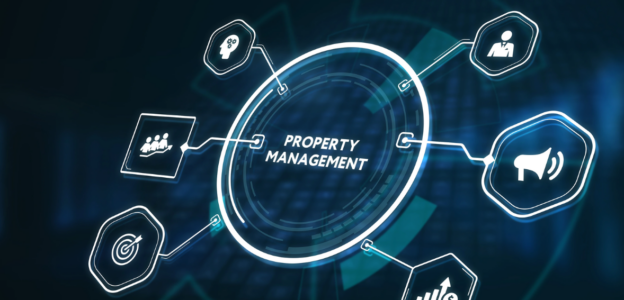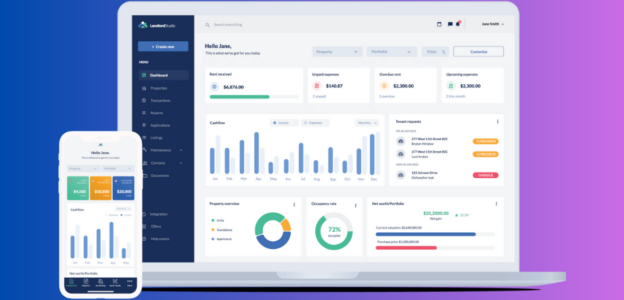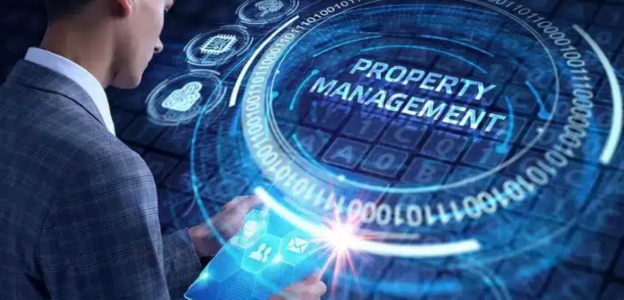Germany’s property management market is a key driver of growth within the European real estate sector, offering essential services for managing both residential and commercial properties. This dynamic market covers a range of activities, including property leasing, rent collection, maintenance, and tenant relations. Key players in the industry are instrumental in advancing the sector, supported by a strong real estate market, increasing urbanization, and a stable economic environment.
The sector’s evolution has been shaped by regulatory measures such as the “ordered principle” for rented dwellings, which has significantly impacted real estate agencies. The industry’s growth is further propelled by strict regulations and a focus on sustainability, driving continuous innovation. With a projected Compound Annual Growth Rate (CAGR) of about 4% from 2022 to 2028, the market is expected to expand, fueled by increased construction activity and favorable mortgage conditions. Technological advancements, particularly in Intelligent Property Management Software, are also crucial in enhancing operational efficiency.
Recent Developments in Property Management Software in Germany

Recent developments in Europe’s tech landscape are significantly impacting the property management sector, particularly in Germany. In early 2021, Intel announced plans to invest USD 20 billion in constructing eight chip plant facilities across Belgium, Germany, France, and the Netherlands. This massive investment is set to generate increased demand for specialized security services within facility management.
Meanwhile, Germany’s vibrant Fintech scene continues to thrive, led by innovative startups. By September 2019, the country boasted 202 property-focused Fintech startups, offering a range of disruptive PropTech solutions from online listing services to property management SaaS products and crowdfunding platforms.
Further bolstering this technological advancement, Google opened a new Google Cloud region in Berlin-Brandenburg in August 2021, with a commitment to invest approximately EUR 1 billion by 2030 in digital infrastructure and renewable energy, supporting Germany’s transition towards a digital and sustainable economy. These developments underscore a broader trend of digital transformation and sustainability within the German property management industry.
Future outlook for Germany's property management market

The future outlook for Germany’s property management market is marked by a projected Compound Annual Growth Rate (CAGR) of approximately 4% from 2022 to 2028. This growth trajectory is anticipated to be primarily fuelled by the integration of cutting-edge technologies poised to transform the industry. Adopting artificial intelligence, the Internet of Things (IoT), and blockchain technologies is expected to automate key property management tasks such as rent collection, maintenance scheduling, and property inspections, significantly enhancing operational efficiencies and reducing costs.
Sustainability has also emerged as a critical focus area within the real estate sector, driven by increasing environmental awareness and stringent regulatory frameworks. Property managers are expected to adopt more eco-friendly practices and work towards obtaining green certifications for their properties to align with market demands and regulatory standards.
Moreover, the rise in smart building technologies is anticipated to revolutionize tenant experiences and operational processes. Innovations such as smart security systems, advanced energy management solutions, and interactive tenant engagement platforms are likely to become staples in property management services, enhancing both efficiency and tenant satisfaction.
Demographic shifts, including an aging population and changes in family structures, are also expected to influence housing preferences significantly in the coming years. Property managers must remain adaptable, offering more flexible housing options such as co-living spaces, serviced apartments, and senior living facilities to cater to these evolving needs. This dynamic approach will be essential for staying competitive in a rapidly changing market landscape.
Now, we will explore the market leaders in property management software in Germany.
Immoware24
Immoware24 is a cloud-based property management software Germany that has established itself as one of the leaders in Germany. The platform caters to property management firms, real estate agents, and housing associations. Immoware24 allows users to manage everything from tenant communication to financial reporting, all within an intuitive, easy-to-use interface.
Features
Comprehensive tenant management: Immoware24 allows property managers to store detailed tenant profiles, track lease terms, and manage rental agreements. With a centralized system, it becomes easier to communicate with tenants, automate rent collection, and handle lease renewals.
Financial management tools: One of Immoware24’s biggest strengths is its accounting features. These include automated invoicing, real-time financial reports, and the ability to track rent payments, service charges, and other expenses. Users can generate balance sheets and income statements directly within the platform.
Maintenance and repair tracking: Immoware24 includes a module for managing maintenance requests. This feature allows users to track repair work, assign tasks to contractors, and monitor the status of jobs. Property managers can receive notifications when a new maintenance issue arises, ensuring a swift response.
Document management: Immoware24 allows users to store documents such as lease agreements, property deeds, and legal correspondence securely. Documents can be categorized and easily retrieved when needed, enhancing organization and accessibility.
Customizable reports: Users can generate a variety of reports that provide insights into rent payments, occupancy rates, maintenance costs, and financial performance.
Pricing
Immoware24 offers a range of pricing plans based on the size of the business and the number of managed properties. The base plan starts at around €50 per month, and customized pricing is available for larger enterprises. Larger property management companies or real estate agents managing multiple properties can expect higher subscription tiers with additional functionality.
Unique Selling Points
Cloud-based accessibility: Being cloud-based, Immoware24 can be accessed from anywhere with an internet connection, which provides flexibility to property managers who may need to work remotely.
Integration with third-party applications: Immoware24 integrates with popular accounting software such as DATEV, simplifying the process of syncing financial data and reducing manual data entry.
Scalability: The platform grows with your business, making it suitable for small property managers as well as large real estate firms.
2. Haufe Property Management
Haufe Property Management is part of the Haufe Group, a leading business software provider in Germany. Haufe’s property management software Germany is particularly well-suited for real estate professionals looking for a comprehensive system that can handle everything from financial management to tenant communication. This software is ideal for medium to large real estate management companies seeking to digitize their operations fully.
Features
Property and tenant management: Haufe Property Management helps real estate managers maintain accurate records of tenants, property units, and lease agreements. It also provides tools for tracking rent payments, deposits, and overdue balances.
Financial and accounting features: One of the strengths of the Haufe platform is its robust accounting system, which integrates with the company’s larger ecosystem. Users can manage expenses, generate invoices, and keep track of rent payments and service charges. The system also allows for detailed financial reporting that can be shared with stakeholders or used for auditing purposes.
Integration with Haufe ecosystem: Haufe’s property management software Germany integrates seamlessly with other products from Haufe, such as HR management and payroll software. This offers a comprehensive solution for real estate firms that also need to manage their internal workforce.
Mobile app support: The software provides mobile access through a dedicated app, allowing property managers to oversee their operations on the go. Users can monitor rent payments, access tenant information, and communicate with contractors directly from their mobile devices.
Legal and compliance management: The software assists property managers in keeping track of German legal requirements, including housing regulations, tenant rights, and taxation.
Pricing
Haufe Property Management typically offers customized pricing based on the size and specific needs of the business. Since the Haufe Group provides a broad spectrum of business solutions, they can bundle packages that include property management alongside HR, accounting, and payroll tools.
Unique Selling Points
Complete business solution: The integration with other Haufe software products makes this a compelling choice for large companies that need to manage property operations and back-office tasks like accounting, payroll, and HR.
Advanced reporting tools: Haufe’s software allows for the generation of highly customizable financial and property performance reports, giving users insights into operational efficiency and profit margins.
Industry expertise: Haufe Property Management comes from a well-established company that has decades of experience in developing software solutions, giving users access to high-quality training resources and customer support.
3. FIO Systems
FIO Systems is another top contender in property management software Germany. With an emphasis on flexibility and modularity, FIO Systems is built to cater to the needs of both residential and commercial property managers. Its cloud-based platform offers a range of modules that can be customized based on the size and type of property portfolio.
Features
Customizable dashboards: FIO Systems allows users to set up customizable dashboards that offer at-a-glance views of critical property management metrics. These dashboards can be tailored to highlight specific information like tenant payment statuses, maintenance requests, and lease renewals.
Financial management: Like many of its competitors, FIO Systems provides a robust financial management module. The software automates rent collection, tracks utility expenses, and generates financial reports. Integration with third-party accounting software like DATEV enhances its financial capabilities.
Tenant communication tools: FIO Systems includes a tenant portal where tenants can log in to pay rent, submit maintenance requests, or update their lease information. This portal is an excellent way to keep tenants engaged and reduce administrative overhead.
Document storage and compliance management: The software includes a document management system where users can upload and categorize essential documents like lease agreements, service contracts, and legal paperwork. It also includes features for tracking property inspections and ensuring compliance with local regulations.
Task automation: FIO Systems enables users to automate routine tasks like sending out rent reminders or maintenance schedules. This saves property managers time and reduces the risk of human error.
Pricing
FIO Systems operates on a subscription model with pricing that depends on the number of properties under management and the specific modules required. The company provides a personalized quote based on the user’s needs.
Unique Selling Points
Modular approach: FIO Systems is highly modular, allowing property managers to add or remove features based on their specific requirements. This ensures users only pay for the features they need.
Integration with industry-standard tools: The software integrates with several third-party accounting and CRM tools, allowing users to streamline their business processes.
Strong customer support: FIO Systems offers excellent customer support and training programs to ensure that clients can fully utilize the platform’s capabilities.
4. DOMUS 4000
DOMUS 4000 is a market leader in property management software Germany, offering a comprehensive platform for managing residential and commercial properties. Known for its user-friendly design and powerful features, DOMUS 4000 is widely used by property managers, real estate agents, and housing associations.
Features
Property and tenant management: DOMUS 4000 includes a range of tools for managing tenants and properties. This includes the ability to track rent payments, lease terms, and tenant profiles. Users can also automate rent collection and lease renewals, streamlining many administrative tasks.
Integrated accounting system: The software comes with a fully integrated accounting system that handles rent collection, invoicing, expense tracking, and financial reporting. This reduces the need for external accounting software and ensures that all financial data is easily accessible.
Maintenance and repair management: Property managers can track maintenance requests, assign jobs to contractors, and monitor the status of repairs. This feature ensures that maintenance issues are addressed promptly, improving tenant satisfaction and reducing potential damage to properties.
Advanced reporting and analytics: DOMUS 4000 provides users with a range of reporting tools that offer insights into property performance, rent collection, and occupancy rates. Customizable reports can be generated based on specific needs, helping property managers make informed decisions.
Mobile app support: The software offers mobile app support, allowing users to access key features on their smartphones and tablets. This is particularly useful for property managers who are frequently on the move.
Pricing
DOMUS 4000 operates on a tiered pricing model, with costs varying depending on the size of the property portfolio and the specific features required. The basic package starts at approximately €80 per month, with additional costs for advanced features or larger property portfolios.
Unique Selling Points
All-in-one solution: DOMUS 4000 is a comprehensive platform that covers everything from property management to accounting, making it an all-in-one solution for real estate firms.
User-friendly interface: The software is known for its intuitive design, making it easy for property managers to navigate and use even without extensive training.
Strong analytics capabilities: DOMUS 4000’s reporting and analytics features are some of the most advanced in the industry, providing property managers with valuable insights into their operations.
5. PROPstack
PROPstack is a cloud-based property management platform designed for the German real estate market. It is particularly well-suited for larger property portfolios and real estate firms that need a robust, scalable solution. PROPstack combines property management with advanced data analytics, making it a powerful tool for those looking to optimize their operations.
Features
Portfolio management: PROPstack offers comprehensive tools for managing large property portfolios. Users can track tenant details, lease agreements, and property performance metrics, all from a centralized dashboard.
Financial and accounting tools: The software includes a range of financial management tools, including rent collection, invoicing, expense tracking, and budget management. Users can generate detailed financial reports, which can be shared with investors or used for auditing purposes.
Data analytics: One of PROPstack’s unique selling points is its advanced data analytics capabilities. The software provides users with insights into property performance, market trends, and tenant behaviour, helping them make data-driven decisions.
Tenant and lease management: PROPstack makes it easy to manage tenant details, lease agreements, and rent payments. The software includes automated reminders for rent collection and lease renewals, ensuring that nothing falls through the cracks.
Integration with third-party tools: PROPstack integrates with several popular third-party applications, including accounting software and customer relationship management (CRM) tools. This makes it easier for users to streamline their business processes.
Pricing
PROPstack offers customized pricing based on the size and needs of the real estate firm. The software is available on a subscription basis, with larger property portfolios attracting higher fees.
Unique Selling Points
Advanced data analytics: PROPstack stands out for its focus on data analytics, providing users with valuable insights that can help optimize property performance and improve tenant satisfaction.
Scalability: The platform is designed to grow with the business, making it a good choice for real estate firms with large and diverse property portfolios.
Integration with external tools: PROPstack’s ability to integrate with other software solutions makes it a versatile tool that can adapt to the needs of various property management firms.
Conclusion
The property management software market in Germany is characterized by dynamic growth and innovation, driven by advancements in technology and evolving regulatory demands. Leading platforms such as Immoware24, Haufe Property Management, FIO Systems, DOMUS 4000, and PROPstack offer diverse solutions tailored to both residential and commercial property management needs. These software solutions excel in features like financial management, tenant communication, and compliance tracking, each with unique strengths to cater to various scales and complexities of property portfolios.
As the market continues to expand, driven by trends like digital transformation and sustainability, property management software is set to play an increasingly pivotal role in enhancing operational efficiency and tenant satisfaction. Embracing these technologies will be crucial for property managers looking to stay competitive in a rapidly evolving industry landscape.
Frequently Asked Questions
Immoware24 can manage both residential and commercial properties, making it versatile for various property management needs, including tenant communication, lease management, and financial reporting.
DOMUS 4000’s comprehensive features, including advanced reporting and analytics, integrated accounting, and maintenance management, make it well-suited for large property management firms with complex needs.
Haufe Property Management offers extensive customer support, including training resources and assistance with software integration, ensuring users can fully utilize the platform’s capabilities.



































